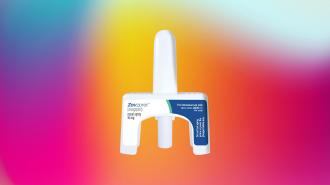The FDA has approved a fast-acting nasal spray for migraines that gives migraine sufferers a brand new way to treat these painful headaches.
The challenge: Migraines are a type of recurrent headache characterized by moderate to severe pain, usually on one side of the head. This pain can last for 4 to 72 hours and is often accompanied by nausea, vomiting, and sensitivity to light and sound.
More than a billion people worldwide get migraines, and while there’s no cure, there are medications that can treat symptoms and shorten the duration of an attack.
People who experience nausea during migraines can have trouble tolerating oral meds, though, and the few nasal sprays for migraines all use triptans, a class of drugs that relieve migraines by constricting blood vessels, which makes them unsuitable for people with vascular diseases.
“We’ve been waiting for this medication to come out.”
Timothy A. Collins
A new migraine medication: In May 2022, Pfizer acquired Biohaven, a pharmaceutical company developing a nasal spray for migraines called “zavegepant.”
Rather than constricting blood vessels with triptans, this new migraine medication blocks calcitonin gene-related peptides (CGRP), a type of protein that is present in higher levels during migraine attacks and that has been linked to pain and inflammation.
Pfizer recently published the results of a phase 3 trial of zavegepant involving about 1,400 people. It found that 24% of participants who used the spray were free from pain within two hours compared to 15% in the placebo group, and some even felt relief as quickly as 15 minutes.
Based on the results of that trial, as well as a phase 2/3 study, the FDA has now approved Pfizer’s nasal spray for migraines for use in adults.
Why it matters: While a few CGRP inhibitors were already on the market prior to this approval, zavegepant will be the first that’s delivered via a nasal spray, making the alternative treatment approach available to people who can’t tolerate oral meds for the first time.
“We’ve been waiting for this medication to come out,” Timothy A. Collins, chief of the headache division at Duke University Medical Center’s neurology department, who wasn’t involved in the trial, told the New York Times. “It’s a really helpful addition to migraine management.”
Looking ahead: Pfizer plans to have zavegepant in pharmacies under the brand name Zavzpret as soon as July 2023. The company told Reuters it expects the med to cost about as much as other CGRP inhibitors, and Biohaven is hopeful it’ll become a regular part of migraine management.
“We’ve thought of it as the EpiPen of migraine,” said Vladimir Coric, CEO of Biohaven. “Everyone with migraine should have a zavegepant intranasal around to take control of their migraine and make sure it doesn’t get under way if it comes up in the most inopportune time.”
We’d love to hear from you! If you have a comment about this article or if you have a tip for a future Freethink story, please email us at [email protected].






